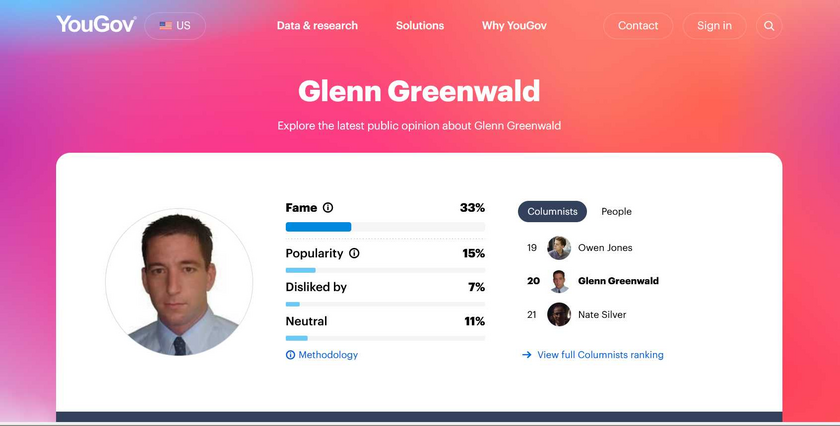Watch the full episode here:

Good evening. It's Thursday, October 12.
Tonight: on last night's show, we reported on a spate of disturbing censorship that is emerging throughout the West, ostensibly designed to outlaw – to criminalize – dissent from the West policy toward the war in Israel and Gaza: exactly as they have spent the last 18 months doing, censoring opponents of the US-NATO proxy war in Ukraine. We know, of course, that the Israel-Gaza war fosters extreme emotion and passion on both sides of the war, on both sides of the debate – and that's true among the viewers of our show as well, which have been and continues to be one of the most ideologically diverse audiences of any political show, a real source of pride for us. We have members of our audience who are strongly in favor of what Israel is doing, who oppose Israeli blockades and occupation, who are disgusted by Hamas, but want humanitarian constraints on how Israel responds.
Whatever your views are on the war or Israel and Gaza, it should be alarming to everyone to watch European governments seize on and exploit these emotions to yet again increase their own censorship power. We reported on several such repressive acts on last night's show, including the UK Home Secretary, warning that the waving of a Palestinian flag or chanting pro-Arab slogans may be a crime under British law, while the mayor of Toronto explicitly warned that protest in support of Gaza may be illegal, exactly using the same rationale they used to try and make a trucker protest in Canada against COVID mandates illegal as well. Today, both France and Germany seriously escalated the censorship to all new and radical levels in the name of this new war. As always, the reason why one should object to censorship, even if the target is views that you may hate, in this particular case is if you acquiesce to these measures because it's your enemies who are being censored this time rather than your friends, then the precedent gets implemented, or at least fortified, and then you will lose the ability to object going forward once those censorship powers start being weaponized against your own views and your own allies, as inevitably happens. We'll tell you about the latest acts of repression.
Then: the dystopian rise of privacy-obliterating technologies is a topic that does not get nearly enough attention on some level. The notion that we have now ceded our privacy in the digital age has become so normalized that one barely notices any longer when there are major advances in the ability of states to digitally track and monitor everything we do. That normalization is really by design. Facebook CEO and founder Mark Zuckerberg had a notorious quote from 2010, namely that “privacy is no longer a social norm,” he decreed – but it was really an observation by him that the Internet is training people, training populations, that there is no need to value personal privacy any longer. There's no reason to be concerned about how corporations and governments spy on you.
A couple of weeks ago, I interviewed Coleman Hughes about how Ted tried to censor his TED talk about race because he advocated colorblindness, a view that TED employees somehow insisted was racist for a black man. Coleman used to advocate colorblindness, the same thing Martin Luther King and many other anti-slavery activists throughout the history of the United States advocated. And I mentioned during that interview with him that I had done a TED Talk in 2014, and I described the process I went through when the topic was essentially one that argued why privacy matters. That was the title of the talk: Why Privacy Matters. Privacy does matter. And it's still being aggressively eroded, primarily by new and stunning surveillance technologies that get far too little attention. One of the genuinely good reporters at The New York Times – yes, there are some – is Kashmir Hill. They're not many, but there are some and she's one of them. She covers technology and privacy for that newspaper. She just published a book that is truly good and important – it's gripping at times – in which she recounts the sometimes-creepy barriers she encountered as she tried to conduct a journalistic investigation of a new company, Clearwater AI, that has developed remarkably invasive facial recognition technology. Obviously, facial recognition technology is supremely invasive. We take our faces wherever we go and if there's technology that can identify us and track us based on our face, that kind of surveillance technology is as ubiquitous as any. We sat down with her for an interview about her new book and about specifically how this technology is already being weaponized by private corporations, billionaires, and government intelligence agencies in ways that I think will amaze you. This is really just part of a rapidly emerging dystopia that relies not just on privacy, crippling technology, but also on analytics to determine who are criminals and who are terrorists and who are other undesirable people – analytics that is used to determine who gets punished, who gets excluded, even who gets droned, at once remarkably efficient, yet remarkably prone to potentially disastrous error. And that includes facial recognition technologies. Well, I think you’ll really enjoy the interview we conducted with her, as well as her new book.
For now, welcome to a new episode of System Update, starting right now.

























